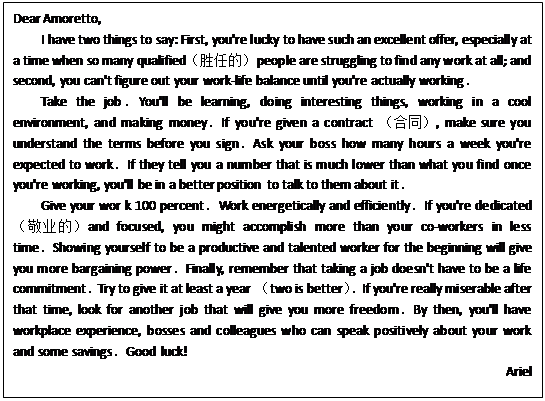题目内容
How can a creature weighing over 5 tons and normally taking 150 kilograms of food and 120 liters of water per day survive in a desert environment?
In the southwest African country of Namibia, and the Sahara lands of Mali further north, the desert elephant does just that.
Although not regarded as a separate species from the African elephant, the desert cousin differs in many ways. Their bodies are smaller, to absorb less heat, and their feet are larger for easier walking across sandy surfaces. They are taller, to reach higher branches. They have shorter tusks (象牙), and most importantly, longer trunks to dig for water in riverbeds.
Desert elephants can travel over 70 kilometers in search for feeding grounds and waterholes, and have a larger group of families, They drink only every 3-4 days, and can store water in a “bag” at the back of their throat, which is only used when badly needed. Desert elephants are careful feeders-they seldom root up trees and break fewer branches, and thus maintain what little food sources are available. Young elephants may even eat the dung (粪便)of the female leader of a group when facing food shortage.
During drought they are unlikely to give birth to their young but with good rains the birthrate will increase greatly. Desert elephants have sand baths, sometimes adding their own urine (尿液) to make them muddy!
As we continue to overheat our weak planet, it can only be hoped that other animal species will adapt as extraordinarily well to change as the desert elephant.
1. The underlined part in Paragraph 2 means“ ”.
A. remains in the African countries
B. drinks 120 liters of water a day
C. manages to live in desert areas
D. eats 150 kilograms of food daily
2.Desert elephants are called careful feeders because they .
A. rarely ruin trees
B. drink only every 3-4 days
C. search for food in large groups
D. protect food sources for their young
3.The author answers the question raised in the first paragraph with .
A. stories and explanation
B. facts and descriptions
C. examples and conclusion
D. evidence and argument
4.What can be inferred from the last sentence in the passage?
A. Overheating the earth can be stopped.
B. Not all animal species are so adaptable.
C. The planet will become hotter and hotter.
D. Not all animals are as smart as desert elephants.
CABB

 口算题卡北京妇女儿童出版社系列答案
口算题卡北京妇女儿童出版社系列答案Here are two letters in WORKWORRIES, a column(栏) in a newspaper:

【小题1】From Amoretto's letter, we know that he __________.
| A.has been working for a long time | B.is likely a green hand |
| C.expects to change his job | D.is quite satisfied with the job. |
| A.By taking a training course. | B.By asking people for advice. |
| C.By comparing with others. | D.Through his own work experience |
| A.understanding the terms before signing |
| B.working hard and efficiently |
| C.getting a better position |
| D.doing the job at least a year |
| A.Take the job offered. | B.Give up and find a new job. |
| C.Depend on your feeling. | D.Choose jobs with great care |
情景对话(共5小题,每小题1分,满分5分)
根据对话内容,从对话后的选项中选出能填入空白处的最佳选项。选项中有两项为多余选项。
Jane: Oh, that's Mr. Taylor. He is so boring.
Mother: What do you mean?
Jane: 6 And he's so quick tempered, mum.
Mother: 7 Are you sure, darling?
Jane: Yes, he gets angry very quickly.
Mother : 8
Jane: And do you know, he spends all his time looking at his reflection in the window, admiring himself.
Mother : Really? 9
Jane: Because he is vain, that's why! And conceited (自负的). He thinks he knows everything.
Mother: Oh, Jane. Be reasonable. I'm sure you're exaggerating (夸张), Mr. Taylor seems such a nice and kind man.
Jane: 10 He's mean (小气的) and cruel.
Mother: Cruel? Now how can a history teacher be cruel?
Jane: Because he only gave me two out of ten marks in my history test.
Mother: Oh, now I understand, Jane. I think you'd better get on with your homework.
|
A.Well, he isn't. |
|
B.And why does he do it ? |
|
C.His lessons send me to sleep. |
|
D.That's doesn't sound like Mr. Taylor at all. |
E. Quick tempered? Mr. Taylor ?
F. Yes, he does.
G. He doesn’t like me.

